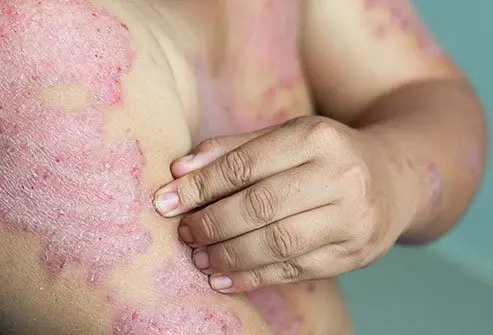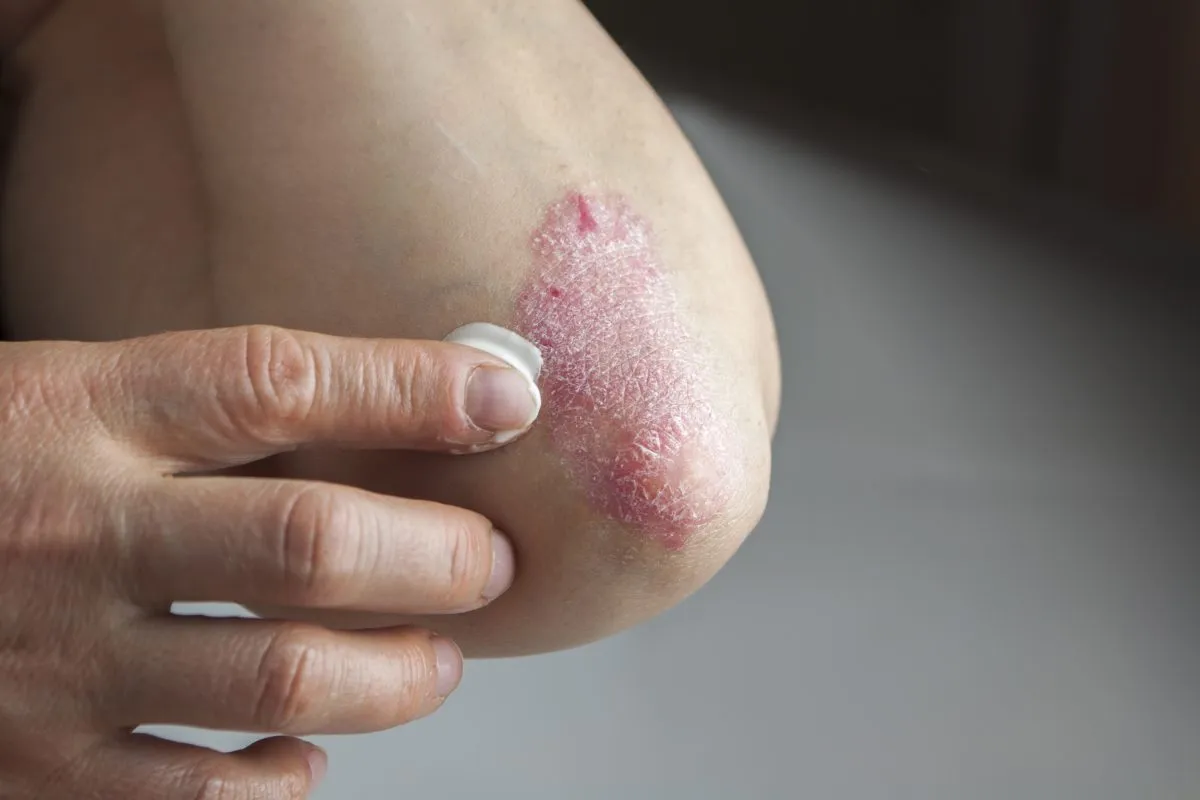Psoriasis
Treatment in Pimpri Chinchwad
Psoriasis is a skin condition that causes discomfort and itchiness. One of the most common types is plaque psoriasis. It affects mainly scaly and thick parts of the skin. While this skin condition has no cure, you can keep the symptoms under control with the help of psoriasis treatment in Pimpri Chinchwad.

What is psoriasis?
It is a condition that causes skin inflammation. Psoriasis skin involves thick parts of the discolored skin surface covered with scales. These scaly, thick parts are known as plaques. It is a chronic condition, which means it can occur at any time and there is no exact cure.
What are the different types of psoriasis?
There are various kinds of psoriasis, such as:
- Plaque psoriasis
It is one of the most common kinds. Around 80 to 90% of patients with psoriasis have plaque psoriasis.
- Inverse psoriasis
It mainly occurs in your skin folds. It leads to fine plaques without scales.
- Guttate psoriasis
It might occur after a stinging throat caused by a streptococcal infection. It looks like a drop-shaped, red, tiny scaly patch and mainly affects young adults and children.
- Pustular psoriasis
It has pus-filled, small bumps above your plaques.
- Erythrodermic psoriasis
This is a serious psoriasis type that affects a huge part (around 90%) of your skin. It leads to extensive skin shedding and skin discoloration.
- Sebopsoriasis
This generally occurs on your scalp and face as plaques or bumps with a yellow, greasy coating. This condition is a combination of seborrheic dermatitis and psoriasis.
- Nail psoriasis
This causes pitting, skin discoloration, and changes to your toenails and fingernails.
What parts of my body will be affected by psoriasis?
Psoriasis can flare up anywhere on the skin. But usually, on your
- Knees and elbows
- Inside your mouth and face
- Toenails and fingernails
- Genitals
- Feet and palms
- Scalp
- Lower back
This skin condition affects a small portion of the skin in many people. However, in serious cases, the plaques cover and connect a larger area of the skin.
How common is psoriasis, and who is affected by it?
People of any sex, race, or age can get psoriasis. It is one of the most common skin diseases and affects millions of people.
What does psoriasis look like?
Psoriasis symptoms on your skin involve plaques. It looks like this:
- A raised or rash area of thick skin
- The plaque skin is discolored
- The plaque is flaky or scaly and sheds deftly
An early psoriasis symptom is tiny bumps. The bump evolves, and scales are formed on the top. The plaque surface might shed, but the scales below it will remain together. If you graze your rash, the scales might tear away from the skin. This can lead to bleeding. If the rash continues to evolve, it can cause larger areas of skin damage. Psoriasis symptoms can vary from mild to severe.
What are the causes of psoriasis?
If you are dealing with psoriasis, your immune system is expected to eliminate foreign invaders, such as bacteria, to prevent sickness and keep you healthy. Instead, the immune system can mistake strong cells for foreign invaders. Hence, it creates swelling or inflammation, which you can see on the skin’s surface as skin plaques.
It generally takes around a month for new skin cells to develop and restore the old ones. Your immune system reduces the timeline significantly, up to 3 to 4 days. The speed of new cells’ development creates skin shedding and scales above the plaques.
Sometimes, psoriasis runs in families. There might be a hormonal component to psoriasis, as parents might pass this skin condition on to their kids.
What are the symptoms of psoriasis?
Along with a rash or skin plaques, you may have symptoms like:
- Dry, cracked skin
- Itchy skin
- Skin pain
- Nails that are crumbly, cracked, or pitted
- Joint pain
If you graze your plaque, you may cause skin irritation and infection. Infections are extremely dangerous. If you experience fever, swelling, or serious pain, you may have symptoms of an infection. If you are experiencing such symptoms, please contact Bodysutra Clinic.
What is the available psoriasis treatment in Pimpri Chinchwad?
Various treatments can ease psoriasis symptoms. Some of the common psoriasis treatment include:
- Dry skin moisturizers
- Medicated shampoos or lotions
- Retinoid creams or vitamin A
- Vitamin D3 ointment
- Medicines to moderate the production of skin cells
Ointments or creams might be sufficient to help the rash in small parts of the skin. If it impacts larger parts of your body or if you are also dealing with joint pain, you might need additional treatments. Joint pain is a symptom of arthritis.

Your dermatologist will select a psoriasis treatment in Pimpri Chinchwad on the basis of:
- Rash’s severity
- Location of the rash
- Your general health
- Your age
If your psoriasis symptoms don’t get better with these medicines and treatments, or if they are worse in larger areas, Dr. Vrushali Nikam at Bodysutra Clinic may suggest the following:
Light therapy
Certain wavelengths of LED light can help reduce inflammation in the skin and slow down the production of new skin cells.
PUVA
Psoralen, a medicine, and ultraviolet light exposure are used in this therapy.
Retinoids
These vitamin-A medications can relieve your psoriasis symptoms but might cause side effects, like birth defects.
Immune therapies
The newest immunotherapy drugs stop your immune system from working, so they can’t cause an autoimmune reaction.
Methotrexate
Dermatologists suggest this drug for serious cases. It might lead to liver disease. However, your doctor will keep track of your progress with various blood tests. You might need biopsies to monitor your liver’s health.
Cyclosporine
This can help with serious psoriasis, but it might cause kidney damage and high blood pressure.
(Note: Talk to Dr. Vrushali Nikam about the side effects and complications of any treatment or medication)
What are the complications related to psoriasis?
For a few people dealing with psoriasis, it causes more than skin discoloration, scaling, and itchiness. It can cause arthritis and swollen joints. If you have psoriasis, you may be more likely to:
- Obesity
- Heart Attacks
- Strokes
- Diabetes
- High cholesterol
How do you prevent the complications of psoriasis?
You can follow a few steps to prevent psoriasis complications:
- Exercising daily
- Quit smoking
- Getting sufficient sleep
- Follow a balanced diet.
Based on your condition and symptoms, Dr. Vrushali Nikam can give you the best psoriasis treatment in Pimpri Chinchwad. Bodysutra Clinic has been helping people with skin problems for the past 7 years. They have promised to provide safe and effective treatments. We have a team of highly trained and experienced dermatologists who will provide you with comprehensive care.
Book An Appointment
